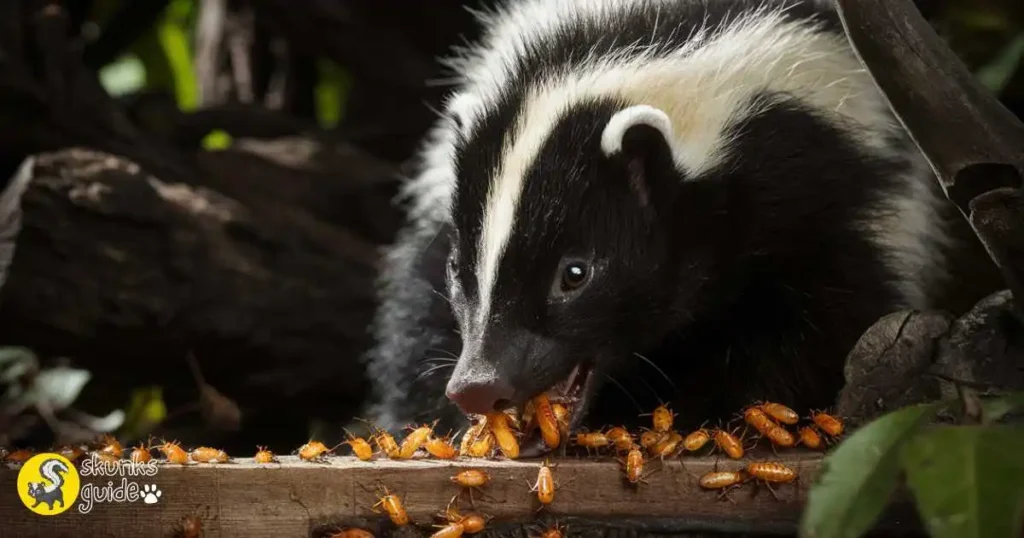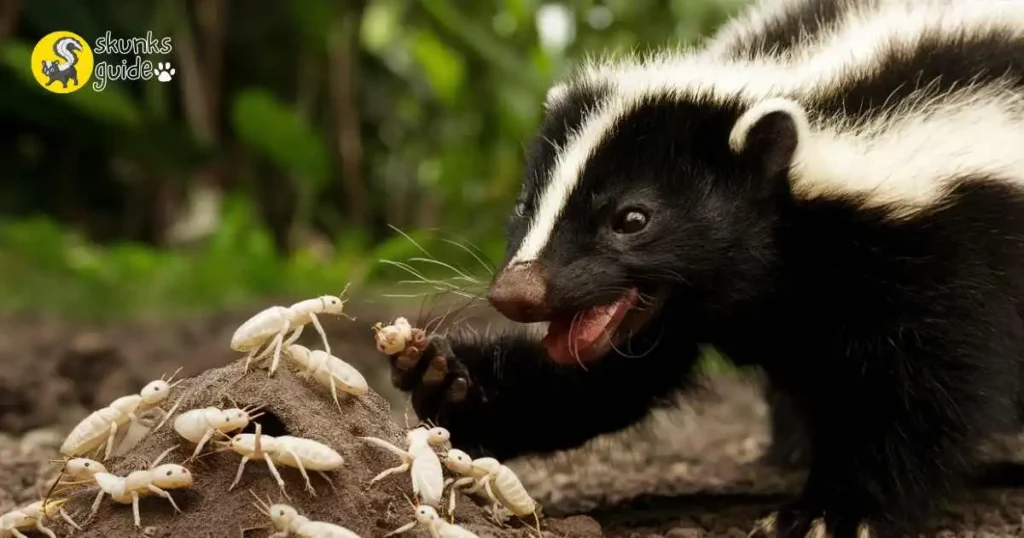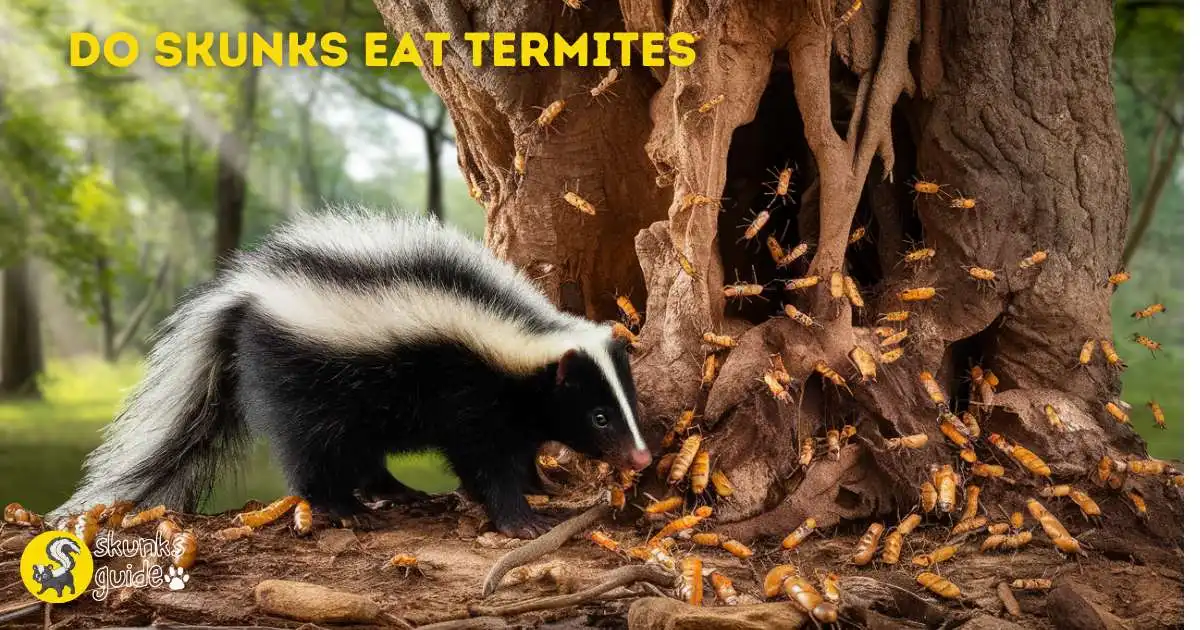Can Skunks Eat Termites? Is It Harmful
Last updated on August 11th, 2024 at 07:24 am
Yes, skunks do eat termites! As someone who has spent years researching skunks and keeping them as pets, I can tell you that termites are a common part of their diet. These black-and-white creatures use their sharp claws to dig into termite mounds and enjoy the nutritious insects. Are they interested in learning more about skunks’ eating habits and their impact on the environment? Keep reading!
Interactions Between Skunks And Termites
The animal kingdom is full of surprising dining habits, and among these are the interactions between skunks and termites. Both skunks, known for their distinctive smell, and termites, notorious for their wood-eating habits, play unique roles in their ecosystems. A common question arises: do these black and white creatures consider termites a tasty snack? Let’s delve into their relationship and discover how skunks interact with these small but significant insects.
Do Skunks Eat Termites?

Skunks are opportunistic eaters with a varied diet that primarily consists of insects and small mammals. Their diet changes with the seasons and what is available in their habitat. Termites, rich in protein, can be a potential food source for skunks, especially when other food options are scarce. Skunks have strong forelimbs and long nails, perfect for digging into termite mounds. They also have a low sense of smell, which is beneficial when hunting for termites that might otherwise repel predators with their chemical defenses.
- Skunks eat various insects, including beetles, bees, and larvae.
- Termites emerge during certain seasons, becoming accessible to skunks.
- Skunks use their digging abilities to access termite mounds.
While skunks do not rely solely on termites, they are part of their omnivorous diet. The extent to which skunks eat termites can depend on factors such as:
| More termites are available in warm seasons | Impact on Skunk-Termite Interaction |
|---|---|
| Season | More termites available in warm seasons |
| Availability of other food | Less competition for termites |
| Location | More termites are available in warm seasons |
Evidence Of Skunks Eating Termites
Concrete evidence of skunks eating termites comes from both scientific observation and the analysis of skunk droppings. Researchers study skunk diets by examining their scat, which often contains insect exoskeletons, including those of termites. Moreover, signs of skunk presence, such as digging marks near termite mounds, suggest that skunks are foraging for these insects.
- Skunk scat often contains termite exoskeletons.
- Digging marks near termite mounds indicate skunk activity.
- Nighttime sightings of skunks near mounds provide direct evidence.
Field studies have shown that skunks may alter their foraging behavior based on termite availability. For example:
| Behavior | Indication of Termite Consumption |
|---|---|
| Digging patterns | Specific to termite mound excavation |
| Time spent at a site | Longer durations suggest successful feeding |
| Scat analysis | The presence of termite parts confirms the consumption |
While not the main component of their diet, termites do serve as a food item for skunks. These findings highlight the flexible and adaptive nature of skunk foraging habits.
Benefits Of Skunks Eating Termites
Did you know that skunks eat termites? Yes, these black and white creatures help control termite populations. This eating habit brings several benefits to our environment and even our homes. Let’s explore how skunks play a crucial role in managing termite numbers and the positive effects of their dietary choices.

Role Of Skunks In Termite Control
Skunks are natural predators of termites. Their diet helps in controlling termite populations. By eating termites, skunks reduce the need for chemical termite control methods. Chemicals can harm other wildlife and even us. Here’s how skunks help in termite control:
- Searching for Food: Skunks dig into the ground to find termites. This action disrupts termite nests.
- Natural Balance: They maintain a balance in the ecosystem by controlling termite numbers.
- Reducing Chemical Use: With skunks around, we can rely less on harmful chemicals to control termites.
| Method | Benefit |
|---|---|
| Skunks Eating Termites | Reduces chemical usage |
| Chemical Control | Can harm wildlife |
This table shows why skunks are a better option for termite control.
Impact Of Skunks On Termite Populations
The impact of skunks on termite populations is significant. By eating termites, skunks help prevent large termite colonies from forming. This action has several positive outcomes:
- Protecting Homes: Fewer termites mean less damage to wooden structures in homes.
- Saving Trees: Termites also harm trees. Skunks help protect our forests.
- Ecosystem Health: A healthy termite population is vital. Skunks ensure it doesn’t get too large.
By eating termites, skunks play a key role in our environment. They help keep termite populations in check. This balance is essential for protecting homes, trees, and maintaining a healthy ecosystem.
Factors Affecting Skunks’ Consumption Of Termites
Skunks are known for their distinctive stripes and pungent spray, but their diet is less well-known. These nocturnal creatures are omnivores, meaning they eat both plants and animals. Termites can be part of their diet, but various factors influence this. Let’s delve into what affects skunks’ choice to dine on termites.
Availability Of Termites
Termites are not always on the menu for skunks. Their presence in a skunk’s diet largely depends on their availability in the environment. Here are some factors that determine the presence of termites:
- Season: Termites are more active and abundant in warmer months. This makes them easier for skunks to find.
- Habitat: Skunks live in diverse environments, from woods to urban areas. Termites thrive in areas with wood, such as forests and old buildings.
- Weather conditions: Wet conditions can lead to termite swarms. Skunks might take advantage of this sudden food source.
Consider a table that shows the correlation between termite population and the likelihood of skunks eating them:
| Season | Termite Activity Level | Skunk Consumption Likelihood |
|---|---|---|
| Spring | High | More Likely |
| Summer | High | More Likely |
| Fall | Medium | Less Likely |
| Winter | Low | Least Likely |
Preference Of Skunks For Other Food Sources
Skunks have a wide range of tastes and might prefer other foods over termites. Some reasons for this include:
- Ease of capture: Skunks might opt for easier-to-catch prey like worms and small rodents.
- Nutritional value: They need a balanced diet. Foods rich in proteins and fats might be more attractive.
- Food competition: Skunks might face competition from other animals for termites. They could switch to less contested food sources.
Let’s break down a skunk’s dietary preferences into a simple list:
- Insects and larvae
- Small mammals
- Fruits and berries
- Eggs
- Fungi
As we can see, termites are just one option among many. Skunks will weigh factors like energy spent versus energy gained. This determines their food choices on any given night.
Other Predators Of Termites
Termites are like a buffet for many creatures, and skunks are one of the diners. They use their sharp claws to dig into termite mounds for a feast. But skunks aren’t the only ones snacking on these insects. Let’s dig into the world of termite predators and see who else joins the feast.
Who Else Eats Termites?
Termites are not just a tasty treat for skunks; they are on the menu for a variety of animals. Each predator has its unique way of hunting these insects. Here’s a closer look at the termite’s natural enemies:
- Anteaters: With their long noses, they sniff out termite nests and use their sticky tongues to slurp them up.
- Aardvarks: These nocturnal animals dig into termite mounds with powerful claws and lap up termites with their long tongues.
- Birds: Many birds, like the woodpecker, tap into trees to find termite snacks.
- Reptiles: Lizards and snakes often hunt termites on the ground or in trees.
- Amphibians: Frogs and toads catch termites with their sticky tongues.
Even other insects, like spiders and beetles, enjoy termites. Some creatures, like ants, often raid termite colonies, leading to epic battles. Below is a table that highlights a few termite predators and their unique hunting traits:
| Predator | Hunting Trait |
|---|---|
| Anteater | Long, sticky tongue |
| Aardvark | Strong digging claws |
| Woodpecker | Sharp beak for tapping |
| Lizard | Quick reflexes |
| Spider | Web trapping |
Comparison Of Skunks To Other Termite Predators
Skunks stand out among termite predators. They have strong front claws for digging and a keen sense of smell to locate their prey. When we compare skunks to other predators, we notice differences in hunting techniques and physical traits. Let’s look at how skunks stack up against their fellow termite hunters:
- Anteaters: Anteaters use their sense of smell, but they can’t dig as skunks do.
- Aardvarks: Similar to skunks, aardvarks are expert diggers, but they rely less on smell.
- Birds: Birds hunt from above, unlike skunks, which forage on the ground.
- Reptiles and Amphibians: These predators often wait for termites, whereas skunks actively search for them.
In the table below, we compare various termite predators, including skunks, based on their primary hunting method:
| Predator | Primary Hunting Method |
|---|---|
| Skunk | Foraging and digging |
| Anteater | Using long tongue |
| Aardvark | Powerful digging |
| Woodpecker | Pecking and tapping |
| Lizard | Quick ground hunting |
Each predator has its unique way of catching termites. Skunks are versatile and use multiple senses and skills to enjoy their termite meals.
Frequently Asked Questions
What Are The Predators Of Termites?
Ants, birds, bats, and aardvarks are common predators of termites. Some reptiles and amphibians also feed on termites.
What Is Termite’s Biggest Enemy?
The termite’s biggest enemy is the anteater, known for its diet primarily consisting of ants and termites.
What Pests Do Skunks Eat?
Skunks primarily feast on insects, worms, and grubs. They also eat small rodents, frogs, and birds’ eggs, diversifying their diet based on availability. Their foraging habits help control garden pests, making them natural pest managers.
Conclusion
In wrapping up, skunks have a varied diet, but termites aren’t typically on their menu. These creatures are opportunistic feeders, favoring easier-to-catch prey. Understanding this helps us appreciate the complexity of nature’s food webs. Remember, while skunks may not actively hunt termites, they play their own role in the ecosystem.

